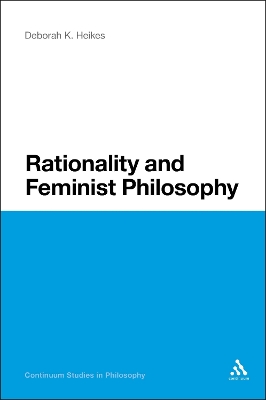Continuum Studies in Philosophy
2 total works
Feminist philosophers have been some of the most vocal critics of reason and rationality. While most feminists realize that rationality is a concept that cannot be entirely abandoned, few have considered how to construct a positive account of rationality.
This book represents a sustained argument for a feminist theory of rationality. It opens by asking the question: is reason inherently masculine? Deborah K. Heikes goes on to answer this question negatively and to examine what feminists actually want from a theory of rationality, specifying what a virtue theory of rationality is and how it works. She identifies those features that feminists believe are central to reason, identifying four dichotomies that are central to feminist thinking (mind/body, reason/emotion, identity/difference, objectivity/subjectivity), and argues that they can be captured by conceiving of rationality as a virtue concept. She further demonstrates how a specifically feminist theory of rationality can provide objective grounds for feminists' moral, political and epistemic agendas.
This book represents a sustained argument for a feminist theory of rationality. It opens by asking the question: is reason inherently masculine? Deborah K. Heikes goes on to answer this question negatively and to examine what feminists actually want from a theory of rationality, specifying what a virtue theory of rationality is and how it works. She identifies those features that feminists believe are central to reason, identifying four dichotomies that are central to feminist thinking (mind/body, reason/emotion, identity/difference, objectivity/subjectivity), and argues that they can be captured by conceiving of rationality as a virtue concept. She further demonstrates how a specifically feminist theory of rationality can provide objective grounds for feminists' moral, political and epistemic agendas.
Rationality and Feminist Philosophy argues that the Enlightenment conception of rationality that feminists are fond of attacking is no longer a live concept. Deborah K. Heikes shows how contemporary theories of rationality are consonant with many feminist concerns and proposes that feminists need a substantive theory of rationality, which she argues should be a virtue theory of rationality.
Within both feminist and non-feminist philosophical circles, our understanding of rationality depends upon the concept's history. Heikes traces the development of theories of rationality from Descartes through to the present day, examining the work of representative philosophers of the Enlightenment and twentieth and twenty-first centuries. She discusses feminist concerns with rationality as understood by each philosopher discussed and also focuses on the deeper problems that lie outside specifically feminist issues. She goes on to consider how each conception of rationality serves to ground the broadly conceived feminist philosophical goals of asserting the reality and injustice of oppression. She ultimately concludes that a virtue rationality may serve feminist needs well, without the accompanying baggage of Enlightenment rationality.
Within both feminist and non-feminist philosophical circles, our understanding of rationality depends upon the concept's history. Heikes traces the development of theories of rationality from Descartes through to the present day, examining the work of representative philosophers of the Enlightenment and twentieth and twenty-first centuries. She discusses feminist concerns with rationality as understood by each philosopher discussed and also focuses on the deeper problems that lie outside specifically feminist issues. She goes on to consider how each conception of rationality serves to ground the broadly conceived feminist philosophical goals of asserting the reality and injustice of oppression. She ultimately concludes that a virtue rationality may serve feminist needs well, without the accompanying baggage of Enlightenment rationality.

